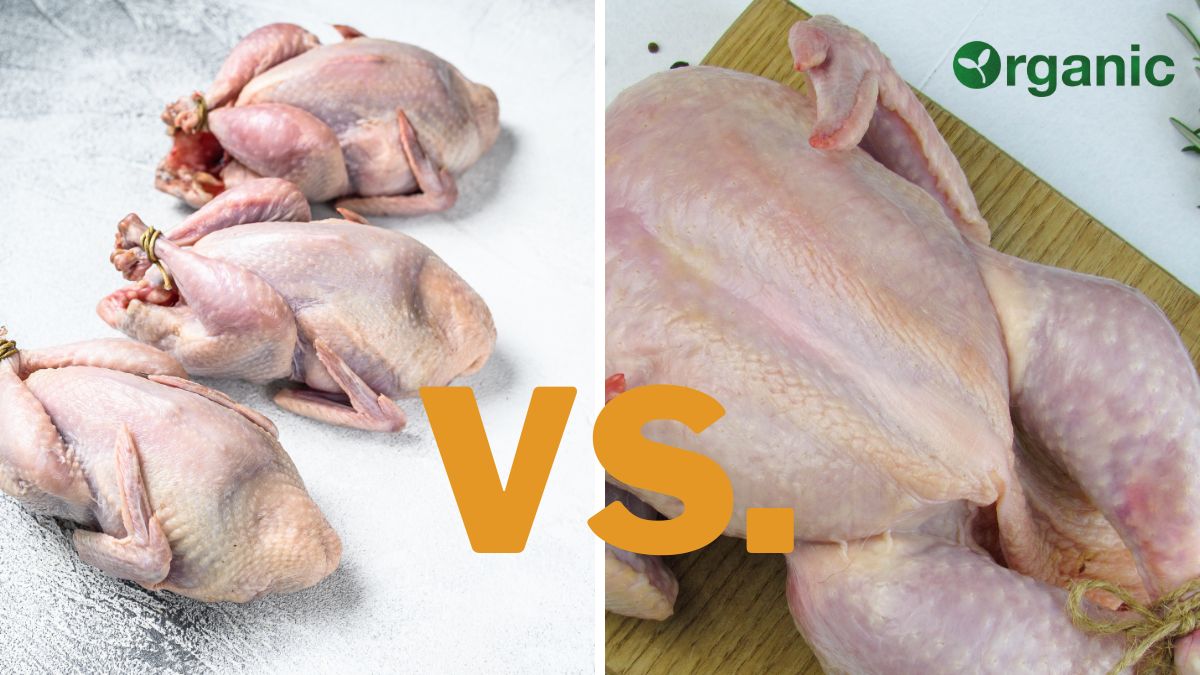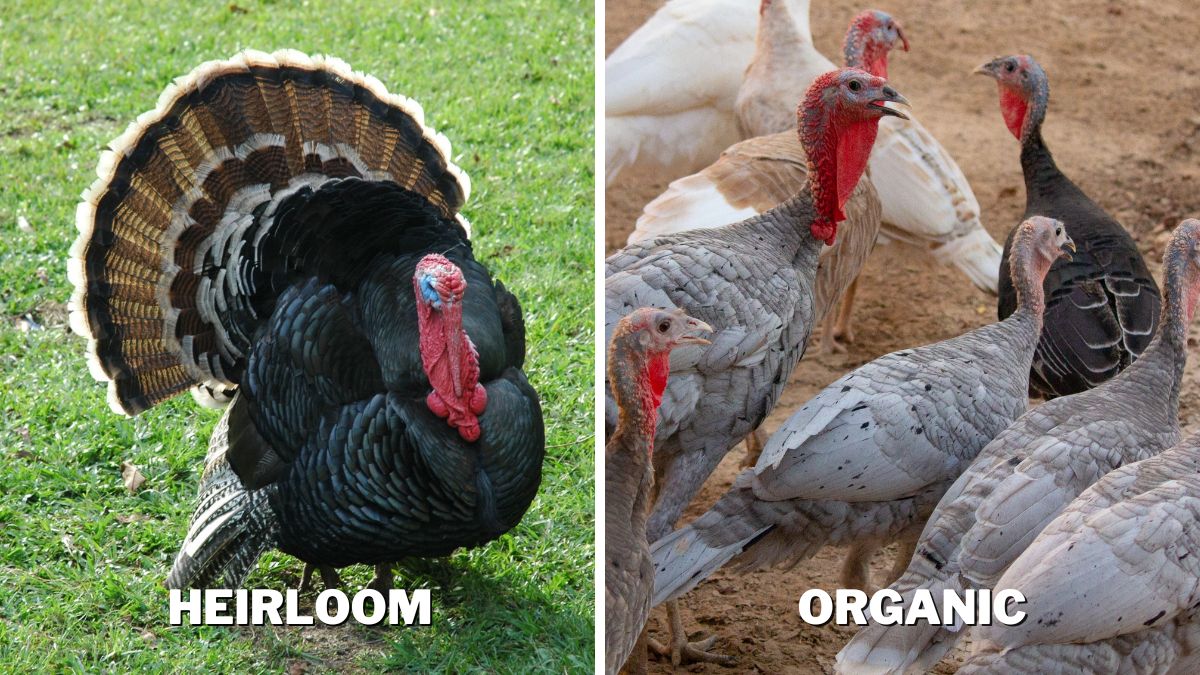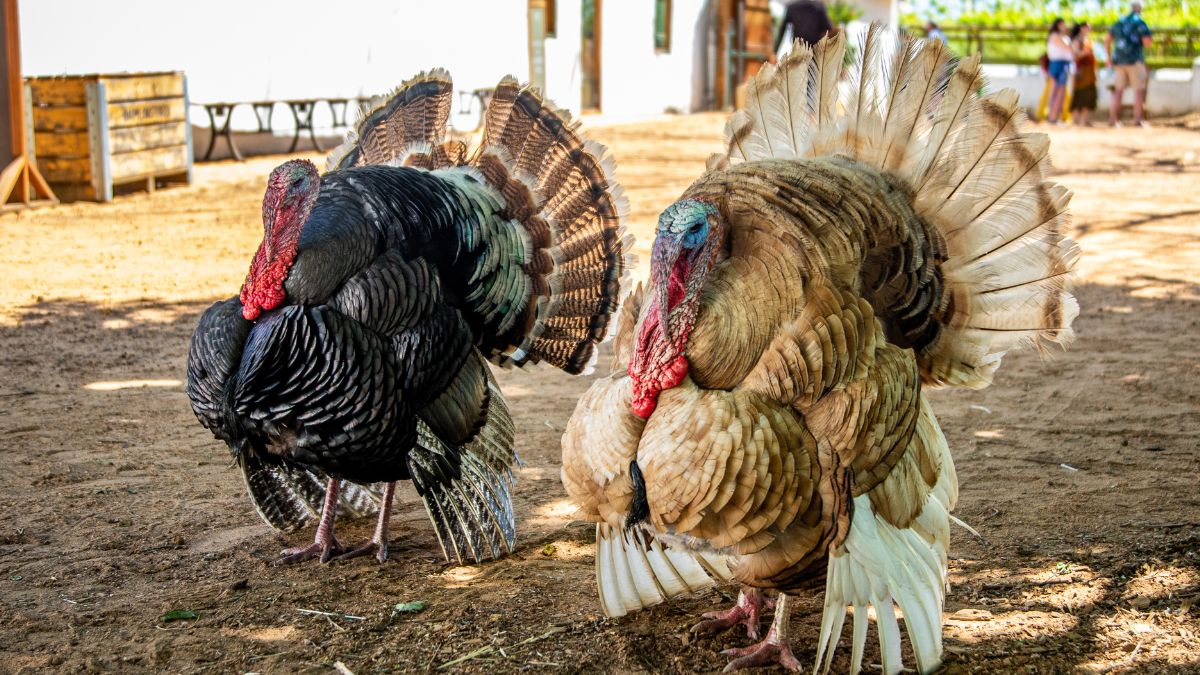Heirloom vs. Organic Turkey: Differences & Which Is Better

When it comes to turkey, are you team heirloom or team organic? Do you even know about the difference? The difference between these two seems to be a never-ending mystery that many struggle to resolve. People really think they’re the same thing. I was grocery shopping with family, and they scolded me for taking so much time choosing between “the same turkeys.” So, I’m here to prove that they’re not the same. So, what are the differences between heirloom and organic turkeys, and which is better?
Heirloom turkeys are known for their unique characteristics and intense flavors. They are smaller in size and have different feather patterns. Organic turkeys are raised following organic farming practices, are fed organic feed, and have similar taste and meat quality to conventionally raised turkeys.
Since this is a topic I’ve discussed over and over, it’s something many people have no clue about. And while it may not seem very important, knowing these differences can change a lot in your meals and your pocket. So, in this article, I’ll tell you everything about organic and heirloom turkeys. Read on for all the important info!
Size and Variations

Yes, it’s just like the name says! Heirloom turkeys really are heirlooms. They are turkey breeds that have remained unchanged with time, so you can consider them the most natural turkeys ever. The thing is, commercially sold turkeys have been modified over time to grow larger and heavier, which in turn brings more profit for the farmer/producer.
Heirloom turkeys are bred from traditional heritage breeds that have been around for generations. You can tell that a turkey is a heirloom just by looking at it. They are smaller than organic or conventionally raised turkeys, and they have very distinctive feather patterns, which isn’t something you see in regular turkeys.
Heirloom turkeys cover several breeds, so heirloom isn’t a specific breed but an umbrella term for turkeys that match that description. Due to their unchanged nature, these turkeys have a very distinct flavor too. They resemble a mixture of game and poultry rather than just poultry.
On the other hand, organic turkeys are more similar to conventionally raised turkeys since they serve the same purpose, i.e., wide commercial availability and profit-making. Organic turkeys are larger than heirloom turkeys, and they are a large group of turkeys that don’t have very different appearances.
Unlike heirloom turkeys that can be of different breeds, organic turkeys are organic turkeys. They have been raised in humane and respectful conditions and environments with natural feed and suitable roaming space.
Just like heirloom turkeys, organic turkeys are also of top quality due to the environments in which they have been raised and are a very popular choice for a big and festive meal.
In a nutshell, both organic and heirloom turkeys are raised almost the same, but heirloom turkeys have been around much longer than organic turkeys, and here you can see how many breeds there are!
Taste and Meat Quality
When it comes to meat quality, both heirloom and organic turkeys are top-quality, so which one you choose is entirely up to you. I prefer organic turkeys because I am more used to the taste, and, honestly, I like them better.
I find heirloom turkeys too robust for my taste, but that doesn’t make them any less delicious. Still, heirloom turkeys are renowned for their exceptional flavor, and not preferring them doesn’t change the fact that many people find their meat to be more flavorful, juicier, and richer in taste compared to commercially raised turkeys.
The unique genetics and slower growth of heirloom turkeys contribute to the development of more distinct flavors and tenderness in the meat. Their meat is denser, and, as I said, it is more of a combination between poultry and game than just poultry.
Organic turkeys are similar to heirloom turkeys, which is to be expected, but they are more similar to conventionally raised turkeys. I prefer organic turkeys because they are milder and gentler than heirloom turkeys, and I can always add more seasoning if they lack flavor.
Because they grow larger, organic turkey meat is softer and chewier than that of heirloom turkeys. They are also a bit fattier, which comes in handy when basting.
In general, both heirloom and organic turkeys are of excellent quality, and choosing one or the other is very subjective, but it doesn’t make one superior to the other.
Packaging and Prices
Heirloom turkeys are typically sold fresh or frozen and are less available than organic turkeys. This is because the heirloom turkeys aren’t entire turkey businesses but a way for local farmers to support themselves. Still, they are properly packed, and the packaging often indicates the breed and heritage of the turkey.
You won’t find heirloom turkeys in big chain stores but rather at farmers’ markets and specialty stores. Due to their smaller-scale production and specialized breeding, heirloom turkeys tend to be more expensive compared to commercially bred turkeys. When I want to buy an heirloom turkey, believe me, it’s a struggle because even if you have a standard farmer you buy from, there may not be turkeys for sale when you want to buy one.
On the other hand, organic turkeys are much more available, and you can find them in many wholesale and retail stores, such as chain supermarkets or your local store. Since they are commercially sold, they are packaged and labeled as organic.
The packaging often highlights the organic certification and may provide additional information about farming practices. Since they are available on a larger scale than heirloom turkeys, organic turkeys are cheaper to buy.
Still, organic turkeys are more expensive than conventionally raised turkeys because of the greater cost of feed and farming practices.
Farming Practices

Heirloom turkeys and organic turkeys are farmed in similar ways but for different purposes and at different scales. Heirloom turkeys are often raised on small family farms or by backyard breeders who prioritize preserving rare and traditional turkey breeds.
Heirloom turkeys are free to roam and fed natural feed. Since they are bred in smaller numbers, they exhibit more natural behaviors and live in alignment with their nature in natural conditions.
Organic turkeys are also raised freely, with plenty of space to roam, and free-fed, not force-fed. They feed on organic feed that satisfies their nutrition needs and is aligned with their carnivorous nature.
Both heirloom turkeys and organic turkeys are free from GMOs, antibiotics, or any other substances that would speed up their growth. The biggest difference between farming heirloom turkeys and organic turkeys is that heirloom turkeys are raised on a small scale, and organic turkeys are raised on a large commercial scale.
The farming practices are very similar for both.
Availability
Heirloom turkeys are significantly less available than organic turkeys. You can’t just buy an heirloom turkey whenever you want to from any store. Still, during the holiday season, when the demand is higher, so is the supply, so you may be able to find an heirloom turkey without much struggle.
Organic turkeys are commercially available in stores and also online, so you will have no trouble finding one at any time of the year.
Which Is Better, Heirloom or Organic Turkey?
It all comes down to your personal preference. Both organic and heirloom turkeys are of impeccable quality and raised with the best farming practices, and, objectively, both are equally good.
If you prefer a more robust, strong, dense, and juicy turkey meat, the heirloom turkey may be the one for you. On the other hand, if you prefer your turkey more on the gentler side, still juicy but a little milder in flavor, the organic turkey is for you.
Do you prefer heirloom or organic turkeys? Can’t wait to read all about it in the comments below!
